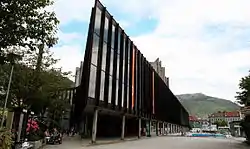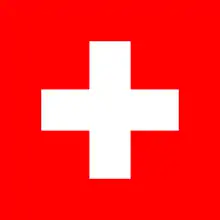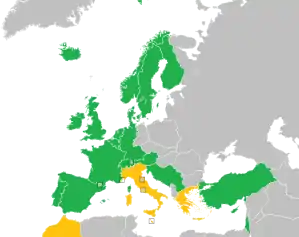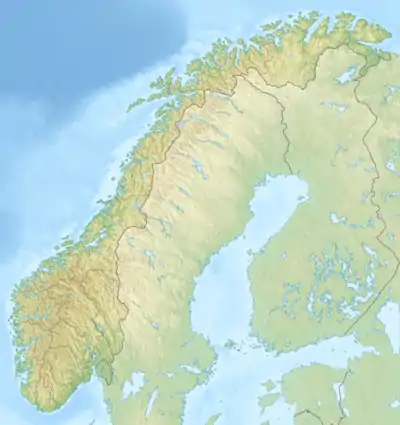Eurovision Song Contest 1986
The Eurovision Song Contest 1986 was the 31st Eurovision Song Contest and was held on 3 May 1986 in Grieghallen in Bergen, Norway. It was the first occasion on which Norway played host to the contest. The presenter was Åse Kleveland, a well-known folk guitarist who was President of the Norwegian Association of Musicians (and a former Eurovision entrant, in 1966).
| Eurovision Song Contest 1986 | |
|---|---|
 | |
| Dates | |
| Grand final | 3 May 1986 |
| Host | |
| Venue | Grieghallen Bergen, Norway |
| Presenter(s) | Åse Kleveland |
| Musical director | Egil Monn-Iversen |
| Directed by | John Andreassen |
| Executive supervisor | Frank Naef |
| Executive producer | Harald Tusberg |
| Host broadcaster | Norsk rikskringkasting (NRK) |
| Opening act | "Welcome to Music" performed by Åse Kleveland |
| Interval act | "Bergensiana" performed by Sissel Kyrkjebø and Steinar Ofsdal |
| Website | eurovision |
| Participants | |
| Number of entries | 20 |
| Debuting countries | |
| Returning countries | |
| Non-returning countries | |
Participation map
| |
| Vote | |
| Voting system | Each country awarded 12, 10, 8-1 point(s) to their 10 favourite songs |
| Nul points | None |
| Winning song | "J'aime la vie" |
The 1986 contest was a first for Eurovision in that royalty were among the guests—Crown Prince Harald, Crown Princess Sonja, Princess Märtha Louise and Prince Haakon Magnus were all in attendance.
Sandra Kim was the winner of this Eurovision with the song "J'aime la vie", representing Belgium. Aged 13, Kim was the youngest ever Eurovision winner. Current rules require Eurovision Song Contest participants to be at least 16, so unless the rule is changed, Kim's record will never be broken. In the lyrics of her song, Kim claimed to be 15 years of age, but after the contest, it was revealed that she was actually 13. Switzerland, who finished second, appealed for her to be disqualified, but it was not successful.
Background

By 1985, Norway had received the unwanted distinction of being "the nul points country," receiving 0 points three times and coming in last six times. When they did win the 1985 Contest, it was a source of pride among Norwegian population, and the national broadcaster, NRK, took full advantage of being able to showcase Norway and its achievements in front of over 500 million television viewers. By the autumn of 1985, NRK had decided to hold the next year's contest at the Grieghallen in Bergen, turning down other bids from capital Oslo, and main cities of Stavanger, Sandnes and Trondheim.
As this was the first time Norway hosted a Eurovision Song Contest, NRK commissioned a lavish budget for the event, turning Grieghallen into a Viking-esque "ice palace" for the live show, complete with white and pastel neon lights for the stage. In addition, NRK also had a special diamond-encrusted dress made for presenter Åse Kleveland for her opening number. The prized dress, which weighed upwards of 15 pounds (6.8 kg), is still available for viewing at NRK's costuming department at Marienlyst in Oslo.
Kleveland sang the multilingual "Welcome to Music" as the opening act, incorporating English and French primarily, in addition to other European languages. BBC commentator Terry Wogan, at the close of Kleveland's number, dryly remarked, "Katie Boyle (a former Eurovision host for the UK) never sang, did she?"
During her opening speech, Kleveland said of Norway's road in the contest, "For those of you who have followed Norway's course through the history of the Eurovision Song Contest, you will know that it has been quite thorny, in fact. So, imagine our joy when last year we finally won, and the pleasure we feel today, being able to welcome 700 million viewers to the top of Europe, to Norway, and to Bergen."
One of the interval acts presented featured Norwegian musicians Sissel Kyrkjebø and Steinar Ofsdal, accompanied by Norwegian national broadcasting orchestra, Kringkastingsorkesteret (KORK). They opened with the traditional song of the city of Bergen, Udsikter fra Ulriken (also known as "Nystemte'n"), and presented a number of familiar tunes while showing the sights and sounds of Bergen area. Ofsdal played a range of traditional Norwegian folk instruments such as accordion, recorder and hardingfele.[1] The presentation launched Kyrkjebø into a career as an internationally recognized artist.
Changes in participation
Iceland competed for the first time, as the national broadcaster RÚV had finally cemented their satellite television connections with the rest of Europe.[2]
Greece withdrew, having been drawn eighteenth in the running order, as the contest coincided with Holy Saturday. Their entry would have been "Wagon-lit" (βάγκον λι), performed by Polina, who was backing vocalist of Elpida at the 1979 Contest.[3][4] Italian broadcaster RAI decided not to send any delegation to Bergen.
Conductors
 Luxembourg - Rolf Soja
Luxembourg - Rolf Soja.svg.png.webp) Yugoslavia - Nikica Kalogjera
Yugoslavia - Nikica Kalogjera France - Jean-Claude Petit
France - Jean-Claude Petit Norway - Egil Monn-Iversen
Norway - Egil Monn-Iversen United Kingdom - no conductor
United Kingdom - no conductor Iceland - Gunnar Þórdarsson
Iceland - Gunnar Þórdarsson Netherlands - Harry van Hoof
Netherlands - Harry van Hoof Turkey - Melih Kibar
Turkey - Melih Kibar Spain - Eduardo Leiva
Spain - Eduardo Leiva Switzerland - Atilla Şereftuğ
Switzerland - Atilla Şereftuğ Israel - Yoram Zadok
Israel - Yoram Zadok Ireland - Noel Kelehan
Ireland - Noel Kelehan.svg.png.webp) Belgium - Jo Carlier
Belgium - Jo Carlier Germany - Hans Blum
Germany - Hans Blum.svg.png.webp) Cyprus - Martyn Ford
Cyprus - Martyn Ford Austria - Richard Österreicher
Austria - Richard Österreicher Sweden - Anders Berglund
Sweden - Anders Berglund Denmark - Egil Monn-Iversen
Denmark - Egil Monn-Iversen Finland - Ossi Runne
Finland - Ossi Runne Portugal - Colin Frechter
Portugal - Colin Frechter
Results
Voting
The winning song, Belgium's "J'aime la vie," received points from every jury (Belgium received five sets of 12 points; every country awarded Belgium at least five points except for Germany, which gave them just one point). Belgium was the winner in the voting from the results of the second jury out of twenty, in the longest winning stretch during voting since 1974. Switzerland was behind Belgium in nearly every part of the voting, but Belgium had a commanding lead from the very beginning. Traditionally some juries give high points to the host country's entrant, but this did not happen this year; no jury gave Norway's song "Romeo" more than six points out of a possible 12.
Belgium scored an absolute record at the time, with Sandra Kim earning a never seen before number of 176 points (that record remained until 1993, with Ireland scoring 187 points), an average of 9.26 points per voting nation. Kim received 77.2% of the maximum possible score, which, as of 2019, still ranks 8th among all Eurovision winners.
Score sheet
| Juries | ||||||||||||||||||||||
|---|---|---|---|---|---|---|---|---|---|---|---|---|---|---|---|---|---|---|---|---|---|---|
| Luxembourg | 117 | 5 | 8 | 12 | 8 | 1 | 8 | 2 | 4 | 7 | 10 | 12 | 8 | 10 | 10 | 2 | 4 | 6 | ||||
| Yugoslavia | 49 | 2 | 7 | 5 | 7 | 3 | 3 | 1 | 3 | 4 | 12 | 1 | 1 | |||||||||
| France | 13 | 3 | 7 | 3 | ||||||||||||||||||
| Norway | 44 | 4 | 4 | 2 | 6 | 6 | 5 | 6 | 6 | 5 | ||||||||||||
| United Kingdom | 72 | 4 | 10 | 6 | 6 | 2 | 4 | 2 | 5 | 2 | 3 | 8 | 8 | 10 | 2 | |||||||
| Iceland | 19 | 5 | 2 | 6 | 4 | 2 | ||||||||||||||||
| Netherlands | 40 | 1 | 2 | 7 | 1 | 8 | 10 | 1 | 3 | 7 | ||||||||||||
| Turkey | 53 | 6 | 12 | 2 | 6 | 8 | 3 | 6 | 8 | 2 | ||||||||||||
| Spain | 51 | 7 | 4 | 6 | 1 | 2 | 8 | 1 | 5 | 3 | 7 | 3 | 1 | 3 | ||||||||
| Switzerland | 140 | 12 | 6 | 7 | 5 | 5 | 3 | 12 | 10 | 4 | 12 | 10 | 12 | 5 | 4 | 12 | 4 | 7 | 10 | |||
| Israel | 7 | 1 | 1 | 5 | ||||||||||||||||||
| Ireland | 96 | 3 | 8 | 3 | 2 | 8 | 5 | 12 | 6 | 2 | 12 | 7 | 12 | 8 | 8 | |||||||
| Belgium | 176 | 10 | 10 | 12 | 8 | 10 | 10 | 10 | 12 | 10 | 10 | 5 | 12 | 1 | 10 | 6 | 6 | 10 | 12 | 12 | ||
| Germany | 62 | 8 | 1 | 12 | 8 | 7 | 8 | 5 | 7 | 2 | 4 | |||||||||||
| Cyprus | 4 | 3 | 1 | |||||||||||||||||||
| Austria | 12 | 2 | 1 | 2 | 6 | 1 | ||||||||||||||||
| Sweden | 78 | 5 | 7 | 2 | 7 | 3 | 12 | 3 | 7 | 12 | 4 | 5 | 6 | 5 | ||||||||
| Denmark | 77 | 5 | 10 | 6 | 7 | 4 | 5 | 3 | 10 | 4 | 7 | 7 | 4 | 5 | ||||||||
| Finland | 22 | 6 | 1 | 1 | 8 | 3 | 3 | |||||||||||||||
| Portugal | 28 | 4 | 4 | 4 | 8 | 7 | 1 | |||||||||||||||
As the free language rule was still cancelled, all songs were performed in native languages to the country they represented. All songs however, with the exception of the song from Cyprus, have had studio versions recorded by the original Eurovision artists in English as well as their own languages.
12 points
Below is a summary of all 12 points in the final:
| N. | Contestant | Voting nation |
|---|---|---|
| 5 | Belgium | Finland, France, Ireland, Portugal, Turkey |
| Switzerland | Belgium, Israel, Luxembourg, Netherlands, Sweden | |
| 3 | Ireland | Austria, Denmark, Spain |
| 2 | Luxembourg | Germany, Norway |
| Sweden | Iceland, Switzerland | |
| 1 | Germany | United Kingdom |
| Turkey | Yugoslavia | |
| Yugoslavia | Cyprus |
Commentators
Participating countries
 Luxembourg – Valérie Sarn (RTL Télévision),[7] Matthias Krings (RTL plus)
Luxembourg – Valérie Sarn (RTL Télévision),[7] Matthias Krings (RTL plus).svg.png.webp) Yugoslavia – Mladen Popović (TVB1), Ksenija Urličić (TVZ 1), Miša Molk (TVL1)
Yugoslavia – Mladen Popović (TVB1), Ksenija Urličić (TVZ 1), Miša Molk (TVL1) France – Patrice Laffont (Antenne 2)[7]
France – Patrice Laffont (Antenne 2)[7] Norway – Knut Bjørnsen (NRK)[8]
Norway – Knut Bjørnsen (NRK)[8] United Kingdom – Terry Wogan (BBC 1)[9]
United Kingdom – Terry Wogan (BBC 1)[9] Iceland – Þorgeir Ástvaldsson (Sjónvarpið)[10]
Iceland – Þorgeir Ástvaldsson (Sjónvarpið)[10] Netherlands – Leo van der Goot (Nederland 1)[11]
Netherlands – Leo van der Goot (Nederland 1)[11] Turkey – Gülgün Baysal (TRT)[12]
Turkey – Gülgün Baysal (TRT)[12] Spain – Antonio Gómez Mateo (TVE2)[13]
Spain – Antonio Gómez Mateo (TVE2)[13] Switzerland – German: Bernard Thurnheer (DRS), French: Serge Moisson (TSR), Italian: Ezio Guidi (TSI)
Switzerland – German: Bernard Thurnheer (DRS), French: Serge Moisson (TSR), Italian: Ezio Guidi (TSI) Israel – No commentator
Israel – No commentator Ireland – Brendan Balfe (RTÉ 1)
Ireland – Brendan Balfe (RTÉ 1).svg.png.webp) Belgium – French: Jacques Mercier (RTBF La Une),[14] Dutch: Luc Appermont (BRT TV1)[15]
Belgium – French: Jacques Mercier (RTBF La Une),[14] Dutch: Luc Appermont (BRT TV1)[15] Germany – Ado Schlier (Erstes Deutsches Fernsehen)[16]
Germany – Ado Schlier (Erstes Deutsches Fernsehen)[16].svg.png.webp) Cyprus – Neophytos Taliotis (RIK)[17]
Cyprus – Neophytos Taliotis (RIK)[17] Austria – Ernst Grissemann (FS1)[18]
Austria – Ernst Grissemann (FS1)[18] Sweden – Ulf Elfving (SVT, TV1)[19]
Sweden – Ulf Elfving (SVT, TV1)[19] Denmark – Jørgen de Mylius (DR TV)[20]
Denmark – Jørgen de Mylius (DR TV)[20] Finland – Heikki Harma and Kari Lumikero (YLE TV1)[21]
Finland – Heikki Harma and Kari Lumikero (YLE TV1)[21] Portugal – Fialho Gouveia (RTP1)[22]
Portugal – Fialho Gouveia (RTP1)[22]
Non-participating countries
Radio
Some participating countries did not provide radio broadcasts for the event; the ones who did are listed below.
 Luxembourg – André Torrent (RTL Radio)
Luxembourg – André Torrent (RTL Radio) France – Julien Lepers (France Inter)
France – Julien Lepers (France Inter) Norway – Erik Diesen and Sverre Christophersen (NRK P1)
Norway – Erik Diesen and Sverre Christophersen (NRK P1) United Kingdom – Ray Moore (BBC Radio 2)
United Kingdom – Ray Moore (BBC Radio 2) Turkey – Fatih Orbay and Bülent Osma (TRT Radyo 3)
Turkey – Fatih Orbay and Bülent Osma (TRT Radyo 3) Israel – Daniel Pe'er (Reshet Gimel)
Israel – Daniel Pe'er (Reshet Gimel) Ireland – Larry Gogan (RTÉ Radio 1)
Ireland – Larry Gogan (RTÉ Radio 1).svg.png.webp) Belgium – French: TBC (RTBF La Première), Dutch: Julien Put and Herwig Haes (BRT Radio 2)
Belgium – French: TBC (RTBF La Première), Dutch: Julien Put and Herwig Haes (BRT Radio 2) Germany – Peter Urban (Deutschlandfunk/NDR Radio 2)
Germany – Peter Urban (Deutschlandfunk/NDR Radio 2).svg.png.webp) Cyprus – Pavlos Pavlou (CyBC Radio 2)
Cyprus – Pavlos Pavlou (CyBC Radio 2) Austria – Hans Leitinger (Hitradio Ö3)
Austria – Hans Leitinger (Hitradio Ö3) Sweden – Jacob Dahlin (SR P3)[19]
Sweden – Jacob Dahlin (SR P3)[19] Denmark – Poul Birch Eriksen (DR P3)
Denmark – Poul Birch Eriksen (DR P3) Finland – TBC (YLE 2-verkko)
Finland – TBC (YLE 2-verkko) Portugal – Fialho Gouveia (RDP Antena 1)
Portugal – Fialho Gouveia (RDP Antena 1)
Spokespersons
 Luxembourg - Frédérique Ries
Luxembourg - Frédérique Ries.svg.png.webp) Yugoslavia - Enver Petrovci[23]
Yugoslavia - Enver Petrovci[23] France - Patricia Lesieur
France - Patricia Lesieur Norway - Nina Matheson[24]
Norway - Nina Matheson[24] United Kingdom - Colin Berry
United Kingdom - Colin Berry Iceland - Guðrún Skúladóttir[25]
Iceland - Guðrún Skúladóttir[25] Netherlands – Joop van Zijl
Netherlands – Joop van Zijl Turkey - Ümit Tunçağ
Turkey - Ümit Tunçağ Spain - Matilde Jarrín
Spain - Matilde Jarrín Switzerland - Michel Stocker[26]
Switzerland - Michel Stocker[26] Israel - Yitzhak Shim'oni[27]
Israel - Yitzhak Shim'oni[27] Ireland - John Skehan
Ireland - John Skehan.svg.png.webp) Belgium - Jacques Olivier
Belgium - Jacques Olivier Germany - Christoph Deumling
Germany - Christoph Deumling.svg.png.webp) Cyprus - Anna Partelidou[17]
Cyprus - Anna Partelidou[17] Austria - Tilia Herold
Austria - Tilia Herold Sweden - Agneta Bolme-Börjefors[19]
Sweden - Agneta Bolme-Börjefors[19] Denmark - Bent Henius
Denmark - Bent Henius Finland - Solveig Herlin[28]
Finland - Solveig Herlin[28] Portugal - Margarida Mercês de Melo
Portugal - Margarida Mercês de Melo
National jury members
 United Kingdom - David Elder (Scotland), Gary Speirs (Wales), Sue Lloyd (London) , Mr T Smith (South), Mr A Brown (Midlands), Miss M Chapman (Anglia) , Mrs M Heathcote (North West), Mr P Jenkinson (South East), Mrs T O'Shea (Midlands), Quentin Smith (South West)
United Kingdom - David Elder (Scotland), Gary Speirs (Wales), Sue Lloyd (London) , Mr T Smith (South), Mr A Brown (Midlands), Miss M Chapman (Anglia) , Mrs M Heathcote (North West), Mr P Jenkinson (South East), Mrs T O'Shea (Midlands), Quentin Smith (South West) Iceland - Berglind Orradóttir, Davíð Scheving Thorsteinsson, Elsa Björnsdóttir, Guðjón Vigfússon, Guðlaug Þorsteinsdóttir, Karl Þorsteins, Margrét Stefánsdóttir, Ríkharður Ríkharðsson, Salóme Þorkelsdóttir, Sigurdór Sigurdórsson, Svanhildur Kristjónsdóttir[25]
Iceland - Berglind Orradóttir, Davíð Scheving Thorsteinsson, Elsa Björnsdóttir, Guðjón Vigfússon, Guðlaug Þorsteinsdóttir, Karl Þorsteins, Margrét Stefánsdóttir, Ríkharður Ríkharðsson, Salóme Þorkelsdóttir, Sigurdór Sigurdórsson, Svanhildur Kristjónsdóttir[25] Turkey - Ayça Eren, Ziya Anadol, Kaan Bozoğlu, Ayşegül Soyalp, Özlem Budakoğlu, Fatma Dikmen, Alaaddin Torun, İlhan Aslanboğan, Zahide Azılı, Saadet Aktemel, Suhal Eriş[29]
Turkey - Ayça Eren, Ziya Anadol, Kaan Bozoğlu, Ayşegül Soyalp, Özlem Budakoğlu, Fatma Dikmen, Alaaddin Torun, İlhan Aslanboğan, Zahide Azılı, Saadet Aktemel, Suhal Eriş[29] Spain – José María Tío (industrialist), Carolina Conejero (student), Rosario Cabanas (horsewoman), Rafael Camino (bullfighter), Marta Cantón (gymnast), Emilio Aragón (comedian), María Cuadra (actress), Javier Escrivá (actor), Blanca Fernández Ochoa (skier), Antonio Imízcoz (journalist), Pablo Pérez (hairdresser)[30]
Spain – José María Tío (industrialist), Carolina Conejero (student), Rosario Cabanas (horsewoman), Rafael Camino (bullfighter), Marta Cantón (gymnast), Emilio Aragón (comedian), María Cuadra (actress), Javier Escrivá (actor), Blanca Fernández Ochoa (skier), Antonio Imízcoz (journalist), Pablo Pérez (hairdresser)[30] Ireland - Martin Jones
Ireland - Martin Jones
Note
- Contains some words in English, French, and Italian.
References
- "YouTube video of 1986 Interval with Sissel Kyrkjebø and Steinar Ofsdal". NRK.
- "History - Eurovision Song Contest 1986". Eurovision.tv. Archived from the original on 2008-08-02.
- "Polina Biography" (in Greek). Archived from the original on 2008-09-07. Retrieved 2008-08-24.
- ""Wagon-lit" single - 1986". Sony Music. Retrieved 2008-08-24.
- "Eurovision Song Contest 1986". The Diggiloo Thrush. Retrieved 5 March 2012.
- "Eurovision Song Contest 1986". 4Lyrics.eu. Retrieved 16 September 2020.
- Christian Masson. "1986 - Bergen". Songcontest.free.fr. Retrieved 2012-08-10.
- "Hvem kommenterte før Jostein Pedersen? - Debattforum". Nrk.no. Archived from the original on November 2, 2012. Retrieved 2012-08-10.
- Eurovision Song Contest 1986 BBC Archives
- "Tíminn, 03.05.1986". Timarit.is. Retrieved 2012-08-10.
- "Welkom op de site van Eurovision Artists". Eurovisionartists.nl. Retrieved 2012-08-10.
- https://eksisozluk.com/1986-eurovision-sarki-yarismasi--878663
- "FORO FESTIVAL DE EUROVISIÓN • Ver Tema - Uribarri comentarista Eurovision 2010". Eurosongcontest.phpbb3.es. Archived from the original on 2012-03-17. Retrieved 2012-08-10.
- "Jacques Mercier : " Gagner est un cadeau empoisonné "". lesoir.be. 2013-05-16. Retrieved 2019-08-09.
- Adriaens, Manu & Loeckx-Van Cauwenberge, Joken. Blijven kiken!. Lannoo, Belgium. 2003 ISBN 90-209-5274-9
- "Eurovision Song Contest 1986". Ecgermany.de. Retrieved 2012-08-10.
- Savvidis, Christos (OGAE Cyprus)
- Archived October 24, 2007, at the Wayback Machine
- "Infosajten.com". Infosajten.com. Archived from the original on July 18, 2012. Retrieved 2012-08-10.
- "Forside". esconnet.dk. Archived from the original on 2012-03-24. Retrieved 2012-08-10.
- "Selostajat ja taustalaulajat läpi vuosien? • Viisukuppila". Viisukuppila.fi. Retrieved 2012-08-10.
- "Comentadores Do ESC - escportugalforum.pt.vu | o forum eurovisivo português". 21595.activeboard.com. Archived from the original on April 21, 2012. Retrieved 2012-08-10.
- "Sumnja od Jugolasvenskog glasanja". Evropesma.org. Archived from the original on April 8, 2012. Retrieved 2012-08-10.
- Dyrseth, Seppo (OGAE Norway)
- "Þjóðviljinn, 01.05.1986". Timarit.is. Retrieved 2012-08-10.
- Baumann, Peter Ramón (OGAE Switzerland)
- "פורום אירוויזיון". Sf.tapuz.co.il. 1999-09-13. Archived from the original on October 8, 2011. Retrieved 2012-08-10.
- "Selostajat ja taustalaulajat läpi vuosien? • Viisukuppila". Viisukuppila.fi. Retrieved 2012-08-10.
- "Halley'in büyük başarısı, Erhan Güner, Milliyet, 4 May 1986
- "000webhost.com - free web hosting provider". Eurofestival.host22.com. Archived from the original on 2011-08-15. Retrieved 2012-08-10.
External links
| Wikimedia Commons has media related to Eurovision Song Contest 1986. |

